
Years ago, on a lark, I changed the bio on my Twitter account to “a walking man” and Robin Sloan messaged me and was like, “Oh! You’re a fan I see!” A fan of what? Of a comic I had never heard of. Jiro Taniguchi’s “A Walking Man.”
It took me then about a year or two to actually buy it, the book. I am not a big comics reader. I have nothing against comics, I’ve just never been enthralled in the way some comics folks can be enthralled. I grabbed the “Director’s Cut” edition: “The Walking Man PLUS” (Editorial Note: the English title on the Japanese edition is weirdly translated as “The Walks of Life,” but the Japanese title is literally “Walking Person,” and I think “A Walking Man” (translated as “The Walking Man” in Western markets) most aptly captures the essence of this work — “The Walks of Life” feels unnecessarily abstract).
The comic is about an (unnamed) man who walks. An extremely norm-core, middle-aged, dad-bod dude who walks. He seems to be in a heterosexual marriage with no children. In the very first chapter he and his (unnamed; sort of? named later? a childhood friend?) wife acquire a dog and name it Yuki (“snow”).
I love the stories in this book so much. They are a manual to life in broad panels. This book says: Look, this is all you need, just these few things. The man walks his middle-class suburban streets. It is safe. There is no violence here. People are taken care of. He walks without a phone, without distraction. He is present and controls his attention. He is happy to get turned around. He is polite and delighted by everyone and everything. A wayward football hits his head and knocks off his glasses. The children apologize profusely. He is not phased, this Walking Man. His glasses are now broken. He is astigmatic. The world is universally fuzzy. He walks with Yuki and Yuki gets excited about something. He puts on his broken glasses and sees a rabbit split into shards. He is betwitched by this. When he returns home his wife is shocked by the broken glasses. No, no, he says. Try them on. It’s fun isn’t it? And then with the glasses off, we see the fuzzy world through his eyes in a final panel and he says, It’s nice like this, too, for a little while longer.
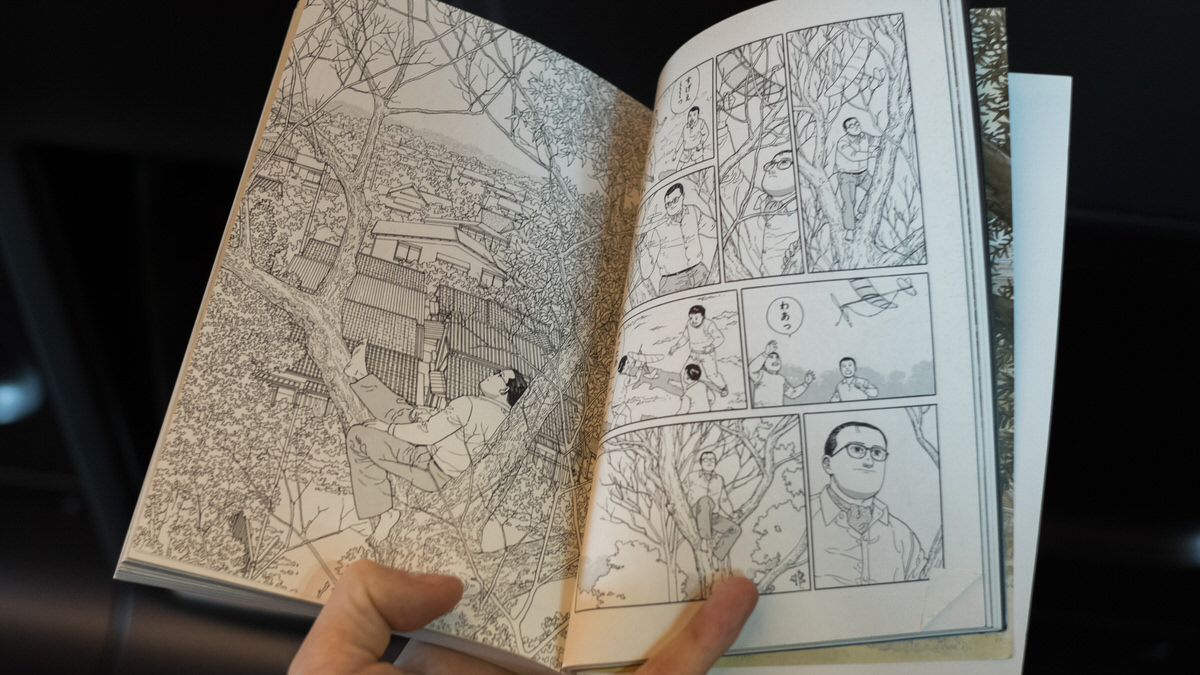
The Walking Man walks and sees some kids playing with a toy airplane. It gets stuck in a tree. Oh, let me get that for you, he says. Really? they say. He takes off his shoes. One does not climb a tree with shoes on. In slacks and a dress shirt, barefoot, he climbs. He gets the plane, throws it down to them. At the top of the tree he realizes — wow, what a lovely view. And so he stays up in the tree without a phone, takes no photographs, just lays back in the boughs of the old oak (or maple or whatever it is; I know nothing about trees), breeze between those doughy toes of his, and gazes with enviable serenity upon his little neighborhood.
The Walking Man knows how to live. Walking, one day, he meets another man in the nearby forest. This man is a bird watcher. Take a peek? offers the man, who has a fancy bird-watching telescope. Oh! our walking man says, placing his eye to the eyepiece. He sees a bird. What bird is this, he asks? The old man tells him. Later the Walking Man walks to the library. He takes out a book about birds. He looks up the bird. Yes, indeed, this was the bird. And, oh, look at that — there’s another one I’ve seen around.
The Walking Man buys a paper balloon at an old-timey toy shop on his local shopping street. He blows it up and bats it around as he walks down the road. Children giggle as they see this middle-aged man enjoying life.
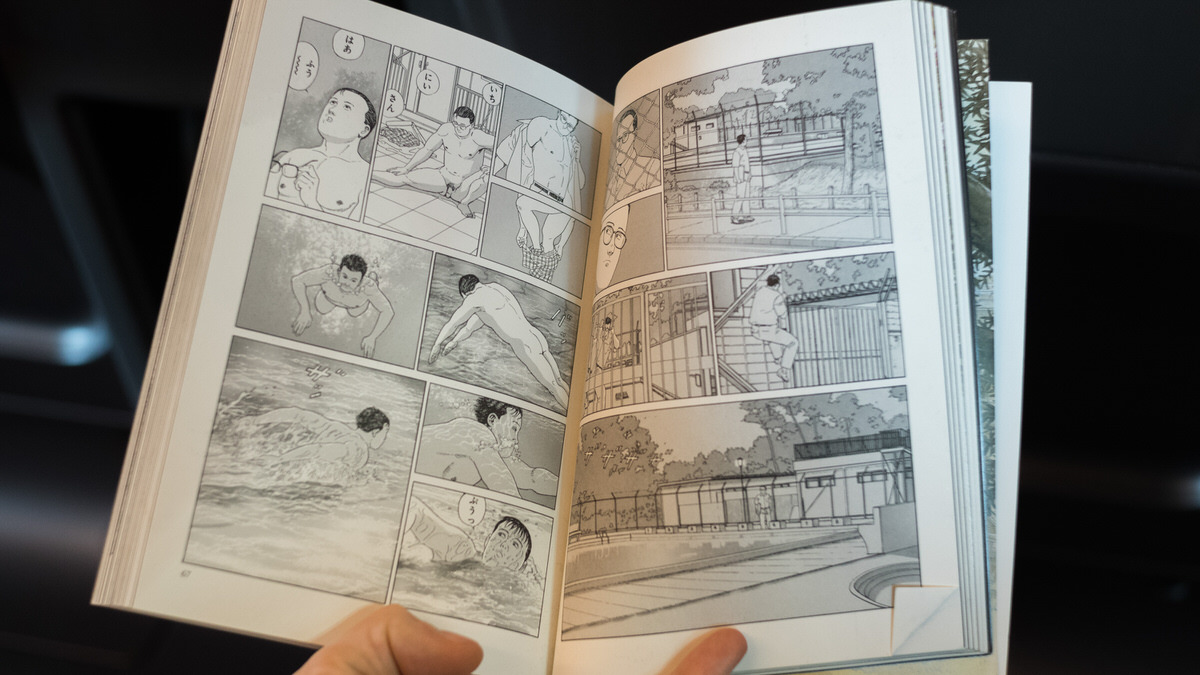
The Walking Man goes out on a walk. It’s summer, and the local public pool is full of swimmers. He smiles and walks on. Later that evening he passes another public pool. This one is closed though. Inspired, the Walking Man hops the fence (!!) (the Walking Man may be polite, but he also knows when to break the rules) and takes off all his clothes (!!!) and performs some strange nude stretches on the deck of this shuttered public pool. We see the Walking Man’s penis. Taniguchi seems to be saying: No, the Walking Man has no sex, he and his wife have not made children, his actions contain no explicit sexual undertones, but he has genitalia — behold. And we do. There it is, the Walking Man’s penis. Very well. And then he is exhaling and diving into the pool, swimming swimming, various strokes — freestyle, butterfly. He is a seasoned man of the water, this we now know. Upon returning home he is dripping wet and his wife asks with a wry smile, Just what have you been up to Honey? (For the record, I do not think the Walking Man is a convicted sexual felon.)
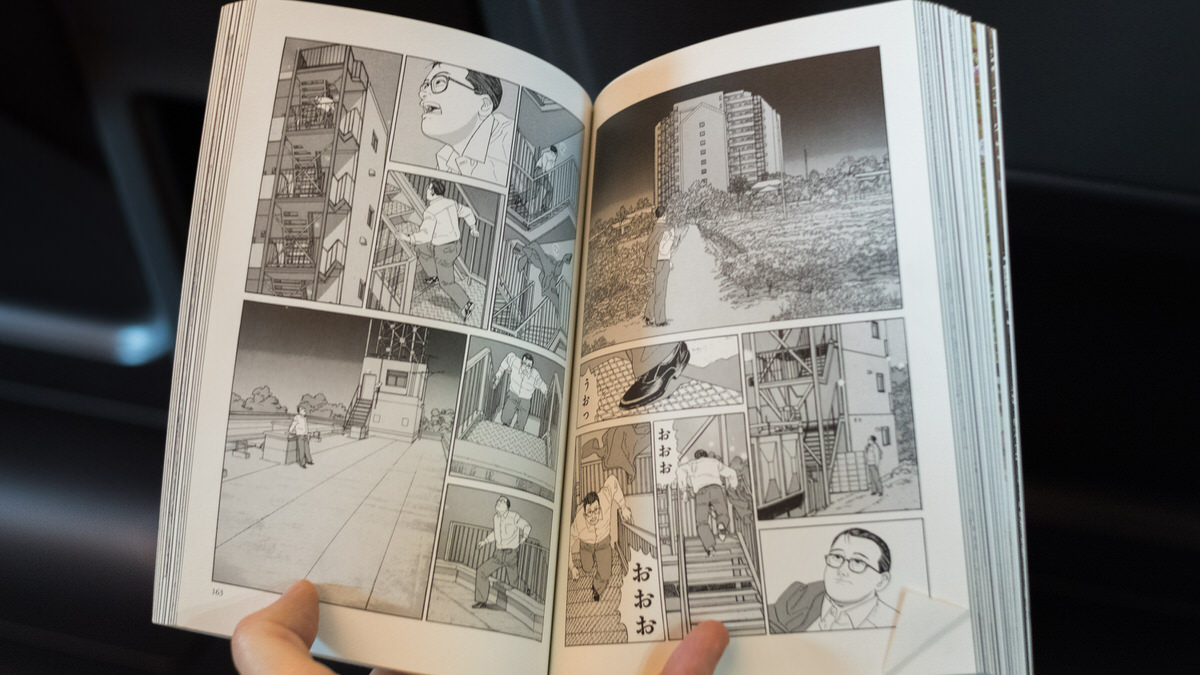
The walking man is drunk. He is walking home after work drinks (we presume). He is but a simple salaryman, and as such he partakes in simple salaryman pleasures. But a simple salaryman, alone, he is not. He contains multiples, and joy. Tipsy, he walks past rice fields. In the distance he spies an apartment complex. Inspired, he heads over to it, and further inspired he sheds his suit jacket and sprints up the fire escape. Eleven stories! Drunk at night! Perhaps the Walking Man is in better shape than we thought. He reaches the top, winded, sits down, and watches the sun rise over the fields.
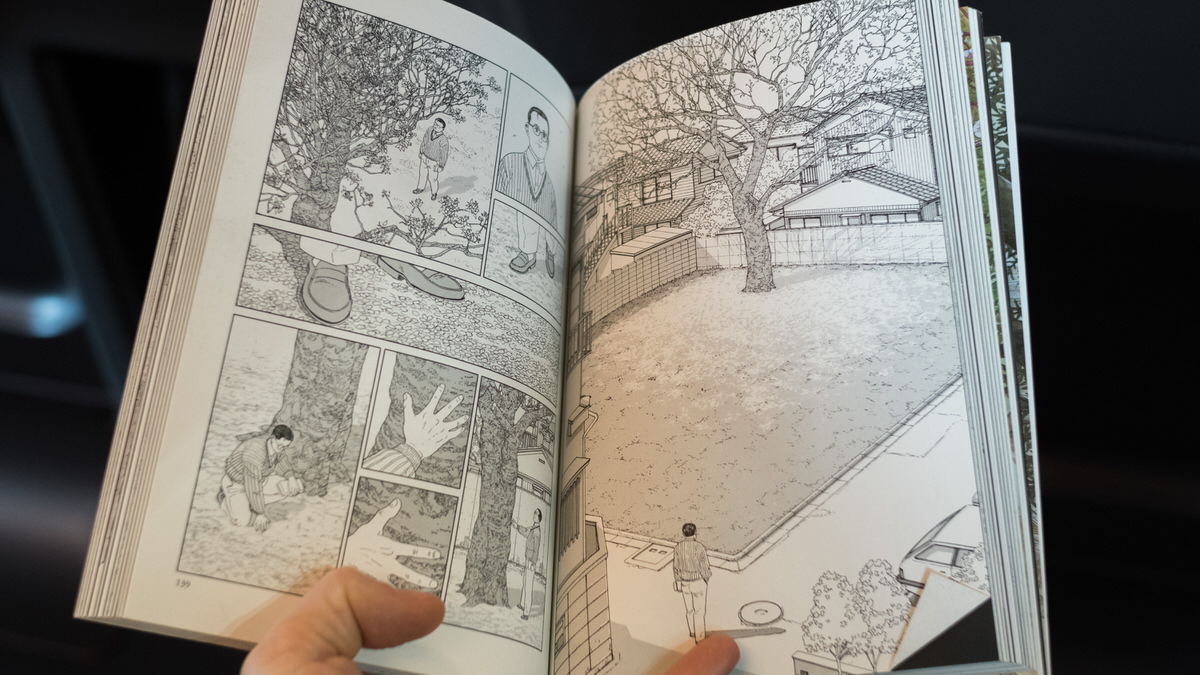
The Walking Man reads books about Frank Lloyd Wright. He rents French films from his local video store. Walking home, he sees a pleasant tree in a vacant lot. It is fall and the ground is covered in leaves. What is a Walking Man to do but lay down in them? So he does. A woman appears. Hello, she says, you’re in my spot. She grew up on this plot and came back after a long absence. She lays down next to him. He is so flustered by the interaction he jumps up and forgets his video. When he returns to get it (it’s there, of course, in the leaves), she is gone. He places his hand in the imprint in the leaves and feels (we presume) the residual heat from her body. (Ah! Perhaps he does have mating impulses.)
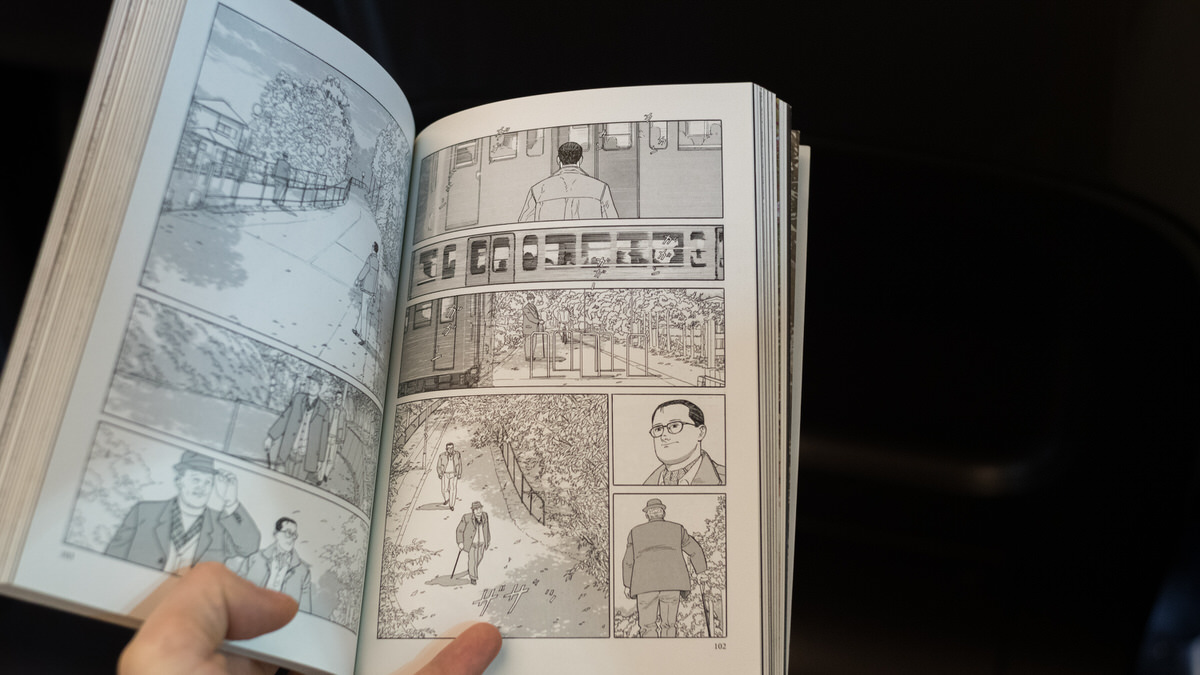
Like this, we are shown, un-didactically what a good life can look like. A somewhat radical life, in many ways.
The Walking Man provides rules for all scenarios. If it begins to rain: Look up and close your eyes and feel the drops on your face. After a typhoon? Go out for a walk, remove your loafers to wade through puddles (yuck) and climb under fallen trees in your slacks. The dirt will be washed away. If you spot a rooster on a fence, climb up as Yuki barks at it, and give life a little rooster wiggle. If you find a dropped case of lipstick, pick it up and leave it on a bench. In the summer, as you carry home on your shoulders huge bamboo shades for your porch, enjoy the sweat — take breaks under bridges and in the forest — knowing that once installed, beer on your eaves in the shadows of that shade will have never tasted sweeter. Have a silent walking race with an old man with a cane. He’ll wait for you on the other side of the train tracks. Walk the narrow alley you’ve never before walked. Help the old woman find the shop she’s looking for. Buy Christmas cake for your partner and eat it at night together next to the swings in a park. Yummy. Yes, yummy. Meet a man fishing and have him tell you, Not catching anything is why I’m here. Get off your train one stop early and walk the rest of the way to work — marveling the whole way at how just one stop difference can rearrange the entire day.
I’m grateful for this book, a quietly powerful book. And for the manga form which itself, too, is powerful. There is no “action” in “A Walking Man” and no classic three act structures, but there is generous and satisfying and legible tension built up around and released by the quotidian, and in this way we learn of the sharpness of Taniguchi’s eye. His work is so powerful he was knighted in France a Chevalier of the Ordre des Arts et des Lettres in 2011. He is the author of “Solitary Gourmet” which was turned into a Netflix series.
As for me, I was walking Sapporo this week, doing a bit of research. I was glad to have revisited Taniguchi’s work. I’ve never had trouble finding delight and excitement in the quotidian. But Taniguchi’s work makes me feel a little less nuts for loving the cut and butter of some toast, or the way someone holds a cigarette in an old cafe, or just the right Wayne Shorter album playing in tribute over some dusty speakers, snow on the rooftops outside.
C
